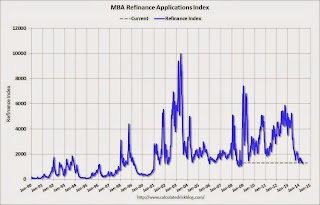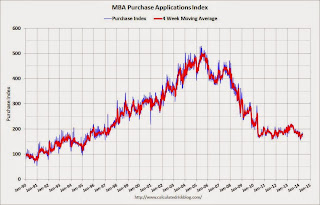by Calculated Risk on 5/07/2014 11:17:00 AM
Wednesday, May 07, 2014
Phoenix Real Estate in April: Sales down 12%, Cash Sales down 33%, Inventory up 49%
This is a key distressed market to follow since Phoenix saw a large bubble / bust followed by strong investor buying.
The Arizona Regional Multiple Listing Service (ARMLS) reports (table below):
1) Overall sales in April were down 12% year-over-year and at the lowest level since April 2008.
2) Cash Sales (frequently investors) were down 33%, so investor buying appears to be declining. Non-cash sales were up year-over-year.
3) Active inventory is now increasing rapidly and is up 49% year-over-year - and at the highest level since 2011.
Inventory has clearly bottomed in Phoenix (A major theme for housing last year). And more inventory (a theme this year) - and less investor buying - suggests price increases should slow sharply in 2014.
According to Case-Shiller, Phoenix house prices bottomed in August 2011 (mostly flat for all of 2011), and then increased 23% in 2012, and another 15% in 2013. Those large increases were probably due to investor buying, low inventory and some bounce back from the steep price declines in 2007 through 2010. Now, with more inventory, price increases should flatten out in 2014.
We only have Case-Shiller through February, but the Zillow index shows Phoenix prices down slightly in March (most recent data), and down 1.2% in Q1.
| April Residential Sales and Inventory, Greater Phoenix Area, ARMLS | |||||
|---|---|---|---|---|---|
| Sales | Cash | Percent Cash | Inventory | YoY Change | |
| Apr-08 | 4,8751 | 986 | 20.2% | 55,7261 | --- |
| Apr-09 | 8,564 | 3,464 | 40.4% | 44,165 | -20.7% |
| Apr-10 | 9,261 | 3,641 | 39.3% | 41,756 | -5.5% |
| Apr-11 | 9,328 | 4,489 | 48.1% | 34,515 | -17.3% |
| Apr-12 | 8,438 | 4,013 | 47.6% | 21,125 | -38.8% |
| Apr-13 | 8,744 | 3,670 | 42.0% | 20,083 | -4.9% |
| Apr-14 | 7,656 | 2,469 | 32.2% | 29,889 | 48.8% |
| 1 April 2008 does not include manufactured homes, ~100 more | |||||
Fed Chair Janet Yellen: Expects Growth Rate to Increase, "A high degree of monetary accommodation remains warranted"
by Calculated Risk on 5/07/2014 10:05:00 AM
Testimony by Chair Yellen on the economic outlook. A couple of excerpts:
Looking ahead, I expect that economic activity will expand at a somewhat faster pace this year than it did last year, that the unemployment rate will continue to decline gradually, and that inflation will begin to move up toward 2 percent. A faster rate of economic growth this year should be supported by reduced restraint from changes in fiscal policy, gains in household net worth from increases in home prices and equity values, a firming in foreign economic growth, and further improvements in household and business confidence as the economy continues to strengthen. Moreover, U.S. financial conditions remain supportive of growth in economic activity and employment.And on monetary policy:
emphasis added
As always, our policy will continue to be guided by the evolving economic and financial situation, and we will adjust the stance of policy appropriately to take account of changes in the economic outlook. In light of the considerable degree of slack that remains in labor markets and the continuation of inflation below the Committee's 2 percent objective, a high degree of monetary accommodation remains warranted.
MBA: Refinance Share of Mortgage Applications under 50% for first time since 2009
by Calculated Risk on 5/07/2014 07:00:00 AM
For the first time since 2009 there were more purchase mortgage applications than refinance applications last week!
From the MBA: Mortgage Applications Increase in Latest MBA Weekly Survey
Mortgage applications increased 5.3 percent from one week earlier, according to data from the Mortgage Bankers Association’s (MBA) Weekly Mortgage Applications Survey for the week ending May 2, 2014. ...
The Refinance Index increased 2 percent from the previous week. The seasonally adjusted Purchase Index increased 9 percent from one week earlier to the highest level since January 2014. ...
...
The refinance share of mortgage activity decreased to 49 percent of total applications from 50 percent the previous week.
"It is official: we are in a majority purchase market for the first time since 2009,” said Mike Fratantoni, MBA’s Chief Economist. “A sizeable increase in purchase applications last week likely reflected the impact of somewhat lower mortgage rates as well as continued growth in the job market, as confirmed by Friday’s employment report from the BLS. Despite the strong increase in the purchase market last week, volume continues to run 16 percent behind last year's pace."
...
The average contract interest rate for 30-year fixed-rate mortgages with conforming loan balances ($417,000 or less) decreased to 4.43 percent, the lowest rates since November 2013, from 4.49 percent, with points decreasing to 0.21 from 0.38 (including the origination fee) for 80 percent loan-to-value ratio (LTV) loans.
emphasis added
 Click on graph for larger image.
Click on graph for larger image.The first graph shows the refinance index.
The refinance index is down 75% from the levels in May 2013 (one year ago).
As expected, with the mortgage rate increases, refinance activity is very low this year.
 The second graph shows the MBA mortgage purchase index.
The second graph shows the MBA mortgage purchase index. The 4-week average of the purchase index is now down about 18% from a year ago.
The purchase index is probably understating purchase activity because small lenders tend to focus on purchases, and those small lenders are underrepresented in the purchase index.
Tuesday, May 06, 2014
Wednesday: Yellen on the Economic Outlook
by Calculated Risk on 5/06/2014 08:44:00 PM
From Business Insider, here are some housing graphs: Here's Jeff Gundlach's Big Presentation On Why Homeownership Is Overrated And Why He's Short The Homebuilders. Gundlach is arguing the homebuilders are overvalued (I have no comment), and I'm not sure if he made any macro predictions.
This is a weird time because housing is improving, but most housing statistics are ugly. As an example, if I hadn't been paying attention - and someone told me the level of mortgage delinquencies and foreclosures - I'd guess the US was in a deep recession. But the trend for delinquencies tells a very different story.
If Gundlach made some macro predictions, please send them along and maybe I'll comment ...
Wednesday:
• At 7:00 AM ET, the Mortgage Bankers Association (MBA) will release the results for the mortgage purchase applications index.
• At 10:00 AM, Testimony by Fed Chair Janet Yellen, The Economic Outlook, Before the Joint Economic Committee, U.S. Congress
• At 3:00 PM, Consumer Credit for March from the Federal Reserve. The consensus is for credit to increase $15.1 billion.
What's Right with Housing?
by Calculated Risk on 5/06/2014 03:37:00 PM
There have been quite a few hand-wringing articles lately discussing the problems with housing. Most articles point to some of these suspects:
1) Existing home sales were down 7.5% year-over-year in March.
2) New home sales were down 13% year-over-year in March and down slightly Q1 over Q1.
3) Housing starts were down 5.9% year-over-year in March, and down 2% Q1 compared to Q1 2013.
4) The 4-week average of the Mortgage Bankers Association (MBA) mortgage purchase index is down 19% compared to the same week last year.
5) Mortgage credit is still tight.
6) Mortgage rates are up significantly from last year.
7) The homeownership rate is still falling.
8) Younger people prefer renting and more ...
Oh my, the sky is falling!
Well, maybe not.
The first mistake these writers make is they are asking the wrong question. Of course housing is lagging the recovery because of the residual effects of the housing bust and financial crisis (this lag was predicted on this blog and elsewhere for years - it should not be a surprise).
The correct question is: What's right with housing? And there is plenty.
1) Existing home sales were down 7.5% year-over-year in March. Wait, isn't that bad news? Nope - not if the decline is related to fewer distressed sales - and it is. (fewer foreclosures and short sales).
2) Mortgage delinquencies are down sharply. See: Fannie Mae and Freddie Mac: Mortgage Serious Delinquency rate declined in March and Mortgage Monitor: Mortgage delinquency rate in March lowest since October 2007, "Only One in 10 American Borrowers Underwater"
3) Mortgage credit is tight. Hey, isn't that bad news? Nope. There is only one way to go ...
 Click on graph for larger image.
Click on graph for larger image.
4) New home sales are up significantly from the bottom, but are still historically very low.
There really is no where to go but up. A growing population will require more new homes. (I'll post again on household formation in the future). The graph for housing starts looks similar.
5) The percent of borrowers with negative equity is declining sharply. See: CoreLogic: 4 Million Residential Properties Returned to Positive Equity in 2013 and Zillow: Negative Equity declines further in Q4 2013
6) The impact from rising mortgage rates is mostly behind us. Economists at Goldman Sachs have found "the effect of monetary policy shocks on [building] permits persists for 3-4 quarters". Rates increased from around 3.5% in May 2013 to 4.4% in July 2013. Since then rates have moved sideways or down a little - and the "3-4 quarters" is almost over.
7) Existing home inventory is increasing, and house price increases are slowing. Sometimes rising inventory is a sign of trouble (I was pointing to this in 2005), but now inventory is so low that it is a positive that inventory is increasing. This will also slow house price increases (I think that will be a positive for housing too - a more normal market).
8) The MBA purchase index is skewed by large lenders. Over the last few years, small lenders (many not included in the MBA survey) have focused on purchase applications (they market through real estate channels and charge lower fees than the large lenders). Other data suggests mortgage applications are mostly flat year-over-year. UPDATE: The MBA told me they have expanded coverage of the index to include many smaller purchase focused lenders. The MBA doesn't believe their data is "skewed" by the large lenders.
9) Investor buying is declining.
Housing is a slow moving market - and the recovery will not be smooth or fast with all the residual problems. But overall housing is clearly improving and the outlook remains positive for the next few years.


